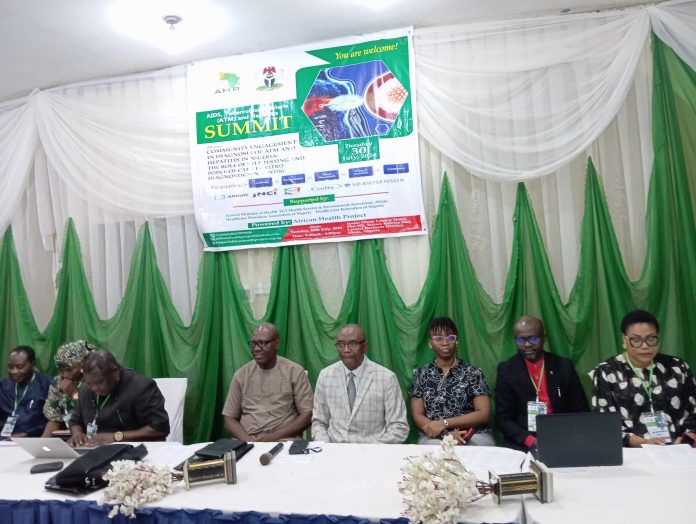On July 30, 2024, a landmark summit was held at the Nicon Luxury Hotel, bringing together key health stakeholders to champion the crucial role of self-testing and Point-of-Care In-Vitro Diagnostics (POC IVDs) in Nigeria’s healthcare landscape.
Led by Dr. Ali Johnson Onoja, CEO of the African Health Project, the summit titled “Community Engagement in Diagnosis of ATM and Hepatitis in Nigeria – The Place of Self-Test and Point-of-Care In-Vitro Diagnostics (POC IVDs)” emphasized the importance of empowering communities with self-testing and POC IVDs to enhance disease surveillance, diagnosis, treatment, and prevention efforts.
Dr. Onoja highlighted the transformative potential of these tools in bridging healthcare gaps and presented findings from the African Health Project’s operational research on HIV self-testing in Nigeria. The study revealed high acceptability and accuracy for both blood-based and oral-based testing methods, with significant variations across different states.
Key recommendations from the study include comprehensive education campaigns, enhanced training for healthcare workers, streamlined testing procedures, and increased accessibility and affordability of self-testing kits. These measures aim to bolster Nigeria’s healthcare system, ensuring it meets the needs of all Nigerians, especially the most at-risk and hard-to-reach populations.
Dr. Onoja concluded, “Let us harness the power of self-test and POC IVDs, alongside community engagement, to create a healthier, more resilient Nigeria.” The summit underscored the collective commitment to advancing healthcare delivery and achieving global health targets.
Adding a critical perspective to the summit, Ofutalu Polinus Nnamdi, Head of the In Vitro Diagnostics (IVD) Department at the Medical Lab Science Council of Nigeria and lab manager at the National Reference Laboratory in Yaba, Lagos, emphasized the necessity of quality test kits for effective disease diagnostics and surveillance.
“Our laboratory in Yaba is the National Reference Laboratory where all test kits, whether produced in Nigeria or imported, undergo rigorous validation testing for in-country use,” Nnamdi stated. “We were invited to this summit to stress the importance of quality in self-testing, rapid diagnostics, and point-of-care testing.”
Nnamdi underscored that for diseases of public health importance, it is crucial that the test kits used, whether for diagnostics or self-testing, meet stringent quality standards. “The regulatory body, Medical Lab Science Council of Nigeria, plays a vital role in this. We are here to highlight our commitment to quality and to ensure compliance with regulatory requirements,” he added.
He called on manufacturers and importers of IVDs to adhere strictly to regulatory standards and urged laboratorians and those who own labs across Nigeria to ensure they procure test kits with the MLSCN IVD listing number, which serves as evidence of quality checks.
“Through this summit, we hope to raise awareness among NGOs, implementing partners, and organizations about the importance of demanding quality products. Whenever they procure test kits, they should look for the IVD listing number as proof of compliance with quality standards,” Nnamdi emphasized.
By enforcing these standards, the Medical Lab Science Council of Nigeria aims to ensure that all diagnostic and self-testing kits used in the country are of the highest quality, thereby enhancing the effectiveness of disease diagnostics and surveillance efforts.
Also, Dr. Chigozie Ujam, Deputy Director of the National Agency for the Control of AIDS (NACA), lauded the efforts of the African Health Project and other organizations in promoting HIV self-testing as part of the broader strategy to combat infectious diseases in Nigeria.
“I’m here on behalf of the government of Nigeria. I’m also here to lend support to the organization because what they’re doing is fantastic,” Dr. Ujam stated. “As the government of Nigeria, our goal is to create enabling environments for initiatives like this. At NACA, our mandate is to ensure that we can get as many people on treatment as possible, starting with testing, keeping them on treatment, and achieving viral suppression.”
Dr. Ujam emphasized the importance of widespread testing in achieving the global 95-95-95 targets, which aim to ensure that 95% of people living with HIV know their status, 95% of those diagnosed receive sustained antiretroviral therapy, and 95% of those receiving therapy achieve viral suppression. “This target cannot be achieved if people do not test. Part of testing is not just what we do in the community, but enabling people to test themselves in the convenience of their own homes through HIV self-testing. It is already part of the testing algorithm from the Ministry of Health,” he noted.
He highlighted the significant strides Nigeria has made in HIV treatment, stating, “We are ahead of the curve in terms of the 95-95-95 targets. We already hit that target. As of 2018, we had 1.6 million people on treatment, which is fantastic. Our prevalence rate has dropped from double figures, like 10%, to as low as 1.7% in some estimates. This is a remarkable achievement.”
Dr. Ujam’s comments were part of a broader discussion at the summit, which focused on “Community Engagement in Diagnosis of ATM and Hepatitis in Nigeria – The Place of Self-Test and Point-of-Care In-Vitro Diagnostics (POC IVDs).” The summit, organized by the African Health Project, brought together policymakers, healthcare professionals, NGO representatives, and community leaders to explore innovative healthcare solutions.
Mr. Manason Garkuwa, one of the resource persons at the summit, presented on the issue of acute HIV infection and its impact on controlling the HIV epidemic in Nigeria. “Most testing that is done for HIV has what we call a ‘window period’ the time between infection and when a test can detect it. People within that period may unknowingly spread the virus because they don’t know they are infected and therefore are not under treatment,” Garkuwa explained. “New technologies are emerging that can narrow this window period, allowing us to detect infections sooner and prevent further transmission.”

